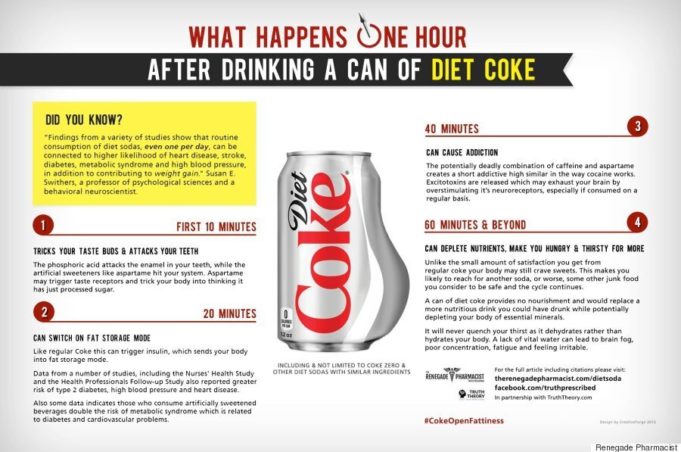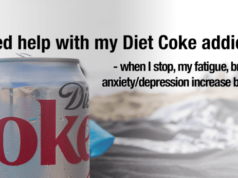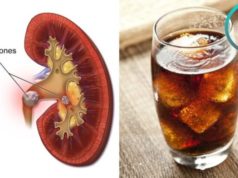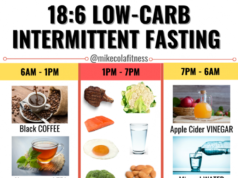Can Diet Coke cause cancer sets the stage for this exploration, diving into the complex relationship between artificial sweeteners, lifestyle factors, and cancer risk. The question has sparked widespread debate, fueled by both scientific research and public perception.
The main culprit in the spotlight is aspartame, the artificial sweetener that gives Diet Coke its sweetness. Aspartame’s potential carcinogenic properties have been a subject of intense scrutiny, with studies suggesting possible links to certain types of cancer. However, the research is far from conclusive, and other lifestyle factors, such as smoking and diet, also play a significant role in cancer development.
The Science Behind Diet Coke and Cancer
Diet Coke, like other diet sodas, is a complex beverage with a unique chemical composition. Understanding its ingredients and their potential effects on the body is crucial when evaluating its link to cancer.
Artificial Sweeteners and Cancer
Artificial sweeteners, like aspartame, are a primary component of Diet Coke. While they provide sweetness without calories, research on their potential link to cancer is ongoing and complex.
Several studies have investigated the relationship between artificial sweeteners and cancer risk. Some studies suggest a possible association between artificial sweeteners and certain types of cancer, such as leukemia and bladder cancer.
For example, a study published in the journal “Cancer Research” found that individuals who consumed high levels of artificial sweeteners were at a slightly increased risk of developing leukemia.
However, other studies have not found a significant link between artificial sweeteners and cancer.
A comprehensive review of existing research by the International Agency for Research on Cancer (IARC) classified aspartame as “possibly carcinogenic to humans” (Group 2B), indicating limited evidence of carcinogenicity in humans.
The complexity of this issue lies in the fact that many studies are observational, meaning they cannot definitively prove cause and effect. It is possible that other factors, such as lifestyle choices and genetics, may play a role in the observed associations.
Studies on Diet Coke and Cancer
While research specifically on Diet Coke and cancer is limited, some studies have explored the relationship between diet soda consumption and cancer risk.
A study published in the “American Journal of Clinical Nutrition” found that individuals who consumed more than two diet sodas per day had a higher risk of stroke.
This study, however, did not directly investigate the link between Diet Coke and cancer.
It is important to note that these studies often focus on the overall consumption of diet sodas, not specifically Diet Coke. Further research is needed to understand the potential effects of Diet Coke consumption on cancer risk.
Comparing and Contrasting Research Findings
The research on the link between diet sodas, including Diet Coke, and cancer is complex and often contradictory. Some studies suggest a possible association, while others do not find a significant link.
For example, a study published in the “Journal of the National Cancer Institute” found no association between diet soda consumption and an increased risk of breast cancer.
The conflicting findings highlight the need for further research to understand the potential effects of diet sodas on human health.
It is important to consider the limitations of observational studies, which cannot definitively prove cause and effect. Additionally, the specific ingredients and their potential effects may vary between different diet sodas.
The Role of Aspartame in Cancer Concerns
Aspartame, the artificial sweetener found in Diet Coke, has been the subject of much debate and concern regarding its potential link to cancer. While research has not definitively proven a causal relationship, several studies have suggested potential carcinogenic properties of aspartame, raising questions about its long-term safety.
Potential Carcinogenic Properties of Aspartame, Can diet coke cause cancer
Aspartame’s potential to contribute to cancer development is a complex issue, with various mechanisms proposed. One theory suggests that aspartame may induce oxidative stress, a process that can damage cells and contribute to tumor formation. Additionally, some studies have indicated that aspartame may disrupt the balance of gut bacteria, potentially leading to inflammation and increased cancer risk.
Mechanisms of Aspartame-Related Cancer Development
Several studies have explored the mechanisms by which aspartame might contribute to cancer development:
* Oxidative Stress: Aspartame’s breakdown products, such as formaldehyde, can generate reactive oxygen species (ROS), leading to oxidative stress. This stress can damage DNA and cellular components, potentially increasing the risk of cancer.
* Gut Microbiota Disruption: Aspartame consumption has been associated with changes in gut microbiota composition. This disruption can lead to increased inflammation and altered immune responses, potentially contributing to cancer development.
* Hormonal Imbalance: Some studies suggest that aspartame may interfere with hormone production or signaling pathways, potentially affecting cell growth and increasing cancer risk.
Specific Cancers Linked to Aspartame Consumption
While research on aspartame and cancer is ongoing, some studies have suggested potential links between aspartame consumption and specific types of cancer:
* Leukemia: Some studies have observed a correlation between aspartame consumption and increased risk of leukemia, particularly in children.
* Lymphoma: A few studies have suggested a possible link between aspartame and lymphoma, but more research is needed to confirm this association.
* Brain Tumors: Some research has explored a potential link between aspartame and brain tumors, but the evidence is currently inconclusive.
Comparison of Safety Concerns Associated with Artificial Sweeteners
| Artificial Sweetener | Safety Concerns |
|—|—|
| Aspartame | Potential carcinogenic properties, oxidative stress, gut microbiota disruption, hormonal imbalance |
| Sucralose | Potential for gut microbiome disruption, concerns about liver toxicity |
| Saccharin | Potential bladder cancer risk, although recent studies have shown mixed results |
| Stevia | Generally considered safe, but potential for allergic reactions in some individuals |
Lifestyle Factors and Cancer Risk: Can Diet Coke Cause Cancer
While Diet Coke’s role in cancer risk remains largely unproven, other lifestyle factors play a much more significant role in cancer development. Understanding these factors is crucial for making informed choices to minimize cancer risk.
Lifestyle Factors and Cancer Risk
Several lifestyle factors have been consistently linked to increased cancer risk. These factors are often more influential than the potential impact of Diet Coke consumption.
Smoking
Smoking is a major contributor to various types of cancer, including lung, bladder, and pancreatic cancer. The chemicals in cigarette smoke damage DNA and promote cell growth, leading to tumor formation.
Alcohol Consumption
Excessive alcohol consumption is linked to an increased risk of cancers of the mouth, throat, esophagus, liver, and breast. Alcohol metabolism produces harmful byproducts that can damage cells and promote cancer growth.
Diet
A diet high in processed foods, red meat, and saturated fats, while low in fruits, vegetables, and fiber, is associated with increased cancer risk. These dietary choices can contribute to inflammation, oxidative stress, and hormonal imbalances, all of which can promote cancer development.
Physical Inactivity
Lack of physical activity is linked to an increased risk of several cancers, including colon, breast, and endometrial cancer. Regular exercise helps maintain a healthy weight, reduces inflammation, and boosts the immune system, all of which contribute to cancer prevention.
Sun Exposure
Excessive sun exposure without proper protection increases the risk of skin cancer. Ultraviolet (UV) radiation from the sun can damage DNA and lead to the development of melanoma and other skin cancers.
Obesity
Obesity is linked to an increased risk of several cancers, including colon, breast, endometrial, and kidney cancer. Excess body fat can contribute to inflammation, hormone imbalances, and altered metabolism, all of which can promote cancer growth.
Family History
A family history of cancer can increase an individual’s risk of developing certain cancers. Genetic predisposition can make some individuals more susceptible to developing cancer.
Environmental Factors
Exposure to certain environmental toxins, such as asbestos, radon, and certain chemicals, can increase cancer risk. These toxins can damage DNA and promote cell growth, leading to tumor formation.
Relative Risk of Lifestyle Factors and Cancer
The relative risk of developing cancer due to various lifestyle factors can vary depending on the specific type of cancer, individual genetics, and other factors. However, the following table provides a general overview of the relative risks associated with different lifestyle choices and cancer development:
| Lifestyle Factor | Relative Risk of Cancer |
|—|—|
| Smoking | Very high |
| Excessive Alcohol Consumption | High |
| Unhealthy Diet | Moderate |
| Physical Inactivity | Moderate |
| Excessive Sun Exposure | High |
| Obesity | High |
| Family History of Cancer | Moderate to High |
| Environmental Toxins | Moderate to High |
| Diet Coke Consumption | Very low |
It is important to note that this table represents a general overview of the relative risks associated with various lifestyle factors and cancer development. The actual risk for an individual may vary depending on several factors, including genetics, age, and overall health status.
Misconceptions and Public Perception
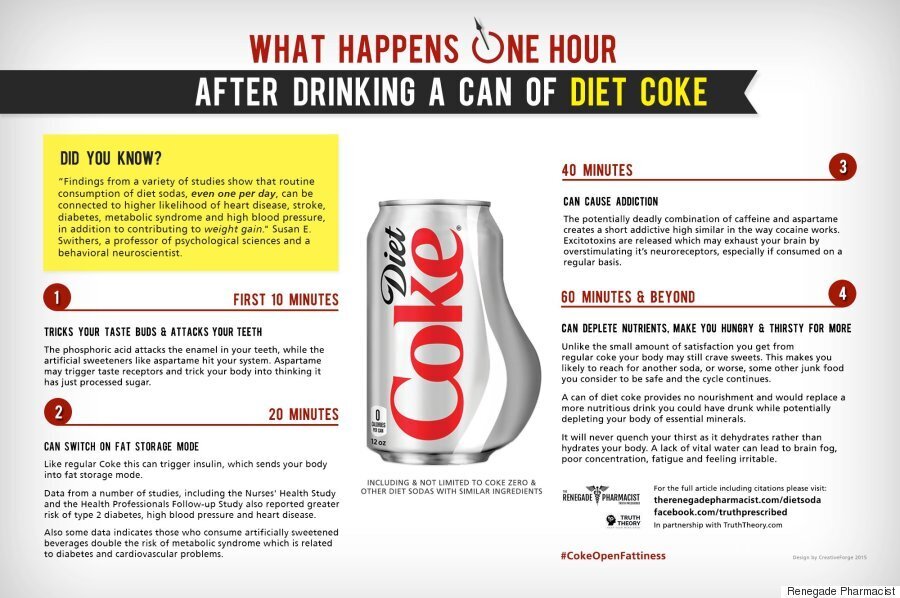
The relationship between Diet Coke and cancer has been a subject of much debate and speculation, often fueled by misinformation and sensationalized media coverage. This has led to a complex interplay of public perception and scientific understanding, where misconceptions can persist despite scientific evidence.
Media Coverage and Misinformation
Media coverage plays a crucial role in shaping public perception of scientific topics. While the media can be a valuable tool for disseminating information, it can also contribute to the spread of misinformation. This is particularly true when it comes to complex topics like cancer, where sensationalized headlines and incomplete reporting can create a distorted understanding of the science.
- Sensationalized Headlines: Headlines that focus on the potential risks of Diet Coke without providing context or nuance can create fear and anxiety among consumers. For example, a headline like “Diet Coke Linked to Cancer” might be based on a study that shows a weak correlation, but the headline may omit important details about the study’s limitations or the need for further research.
- Oversimplification of Scientific Findings: Complex scientific research often involves nuanced conclusions and caveats. However, media reports may oversimplify these findings, leading to a misinterpretation of the actual results. For example, a study that shows a possible association between artificial sweeteners and a specific type of cancer might be presented as conclusive evidence that Diet Coke causes cancer, even though the study may not have proven a causal link.
- Emphasis on Negative Findings: Media outlets may focus on negative findings about Diet Coke and cancer, while downplaying or omitting positive findings or studies that show no link. This selective reporting can create a biased perception of the overall evidence.
Evolution of Public Understanding
Public understanding of the relationship between Diet Coke and cancer has evolved over time, influenced by both scientific advancements and media coverage.
- Early Concerns: In the early days of artificial sweeteners, concerns about their safety were widespread. This was partly due to a lack of long-term studies and the perception that artificial sweeteners were “unnatural” and potentially harmful.
- Focus on Aspartame: In the 1980s, aspartame became the subject of intense scrutiny, with some studies suggesting a possible link to cancer. This led to widespread public concern and a decline in the popularity of aspartame-containing products. However, subsequent studies have largely debunked these claims, and regulatory agencies like the FDA have repeatedly affirmed the safety of aspartame.
- Shifting Focus: In recent years, the focus has shifted from aspartame to other artificial sweeteners, such as sucralose and stevia. While these sweeteners have generally been deemed safe, there is still ongoing research to assess their long-term effects.
Recommendations and Future Research
While the current evidence doesn’t definitively prove a link between Diet Coke and cancer, it’s important to be mindful of potential risks and make informed choices about your health.
Further research is crucial to understand the long-term effects of Diet Coke consumption, particularly concerning the role of aspartame and its potential impact on cancer development.
The question of whether Diet Coke can cause cancer is a complex one, with ongoing research and debate. While there’s no conclusive evidence linking it directly to cancer, it’s important to consider the role of artificial sweeteners in our diets.
In a hospital setting, where strict dietary restrictions are often necessary, healthcare professionals carefully manage the types of diets patients receive. Types of diet in hospital can range from bland to specialized, catering to specific medical needs. Ultimately, when it comes to Diet Coke and cancer, the best advice is to maintain a balanced diet and consult with a healthcare professional for personalized guidance.
Key Areas for Future Research
To gain a more comprehensive understanding of the potential link between Diet Coke and cancer, future research should focus on the following key areas:
- Long-term studies: Conducting long-term, large-scale epidemiological studies that track individuals’ Diet Coke consumption over extended periods and assess their cancer risk. These studies should consider factors like the amount and frequency of consumption, as well as other lifestyle factors that may contribute to cancer development.
- Aspartame metabolism: Investigating the specific mechanisms by which aspartame is metabolized in the body and how these processes might interact with cancer pathways. This research could involve studying the breakdown products of aspartame and their potential effects on cells and tissues.
- Animal models: Utilizing animal models to study the effects of long-term aspartame exposure on cancer development. This research could help determine whether aspartame directly contributes to cancer or if it interacts with other factors to increase risk.
- Synergistic effects: Exploring the potential synergistic effects of aspartame with other dietary components, environmental factors, and lifestyle choices that may influence cancer risk. For instance, researchers could investigate how aspartame consumption might interact with smoking, alcohol consumption, or exposure to certain chemicals.
Conclusion
While the link between Diet Coke and cancer remains a subject of ongoing debate, understanding the science behind artificial sweeteners, lifestyle factors, and cancer risk is crucial. Ultimately, making informed choices about our diet and lifestyle is essential for maintaining good health and reducing cancer risk.
Common Queries
Is Diet Coke safe to drink?
The safety of Diet Coke is a complex issue. While some studies have suggested potential risks associated with aspartame, others have found no clear link to cancer. It’s important to consume all beverages in moderation and maintain a balanced diet.
Are all artificial sweeteners harmful?
Not all artificial sweeteners are created equal. While aspartame has been the subject of much debate, other sweeteners, like stevia, are generally considered safe. However, it’s always wise to consult with a healthcare professional about specific concerns.
What are the best ways to reduce cancer risk?
Maintaining a healthy lifestyle, including a balanced diet, regular exercise, and avoiding smoking and excessive alcohol consumption, is crucial for reducing cancer risk. It’s also important to be aware of family history and consult with a doctor about any concerns.
The question of whether Diet Coke can cause cancer is a complex one, with ongoing research and varying opinions. While the artificial sweetener in Diet Coke, aspartame, has been linked to some health concerns, the evidence is inconclusive. If you’re looking to cut down on your soda intake, you might want to explore some healthy alternatives and learn more about how to cut down on your diet.
Ultimately, the decision of whether or not to consume Diet Coke is a personal one, and it’s important to make informed choices based on your individual health goals.
The link between diet coke and cancer is a topic that’s been debated for years. While studies haven’t shown a direct causal link, some experts recommend focusing on a balanced diet for overall health. If you’re looking to incorporate rice into your diet, check out how to diet with rice for some tips and recipes.
Ultimately, a healthy lifestyle that includes a balanced diet and regular exercise is key to minimizing cancer risks, regardless of your beverage choices.















